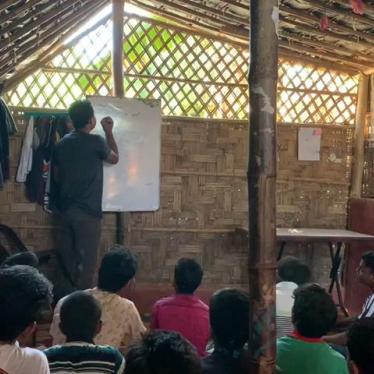(New York)—The Malaysian government is forcibly returning refugees from the war-torn Indonesian province of Aceh back to Indonesia, where their safety is at risk, Human Rights Watch said in a report released today.
The 27-page report, “Aceh Under Martial Law: Problems Faced by Acehnese Refugees in Malaysia,” documents Malaysia’s deportations of refugees and asylum seekers from Aceh and the mistreatment of Acehnese refugees while in Malaysia. In violation of its international legal obligations, Malaysian authorities do not distinguish between Acehnese refugees fleeing conflict and other undocumented Indonesians in Malaysia.
“Acehnese are fleeing a brutal conflict, marked by massive human rights violations,” said Brad Adams, executive director of Human Rights Watch’s Asia division. “Instead of deporting, detaining and abusing them, Malaysia should recognize its legal obligations and offer them a safe place of refuge until it is safe to go home.”
However, Malaysian officials have made it clear that they do not accept their legal obligations towards Acehnese refugees and asylum seekers. Khalil Yaacob, Malaysia’s Minister of Information, said, “We will treat them as we do other refugees. We will detain them and send them back.” The Home Ministry’s parliamentary secretary, Seri Abu Zahar Isnin, made the same point, saying that, “Since Malaysia did not sign the Refugees 1951 Geneva Convention to accept refugees, the term ‘refugees’ cannot be applied to those from Aceh who enter the country illegally. . . . Instead, they are illegal immigrants under Malaysian law.”
“The Malaysian government claims that Acehnese refugees are illegal immigrants,” said Adams. “In fact, Malaysia itself is acting illegally by forcibly returning them to a place where their lives are in danger.”
Thousands of Acehnese have braved a dangerous journey to seek safety in Malaysia since the Indonesian government imposed martial law and began military operations in Aceh in May 2003. Acehnese refugees in Malaysia have reported that Indonesian security forces in Aceh have carried out extrajudicial executions, forced disappearances, beatings, arbitrary arrests and detentions, and imposed drastic limits on freedom of movement.
Once they reach Malaysia, however, Acehnese refugees encounter abuse at the hands of the police. Human Rights Watch found that Malaysian police regularly arrest refugees, raid refugee settlements, and extort money from this vulnerable population.
“They burned eight huts and the canteen,” one Acehnese refugee told Human Rights Watch. “I lost all my clothes, my passport, everything! Everybody ran. It was the Malaysian police.”
The U.N. High Commissioner for Refugees (UNHCR) has designated all Acehnese in Malaysia as “persons of concern” and is issuing protection letters for those who are able to register at their Kuala Lumpur office. However, in August 2003 Malaysian police arrested almost 250 asylum seekers, many of them Acehnese, outside the UNHCR office in Kuala Lumpur. Fearing arrest and deportation, Acehnese refugees have since been reluctant to approach the U.N. agency to make an asylum claim or acquire a protection letter.
“Fear and persecution have left the Acehnese in a legal and protection vacuum,” Adams said. “The Malaysian government should ensure that all Acehnese in Malaysia can live in safety, receive necessary material assistance, and have access to U.N. protection.”
Human Rights Watch called on UNHCR to formally recognize all Acehnese fleeing the war in Malaysia as refugees under its mandate and to insist on carrying out an enhanced protection role in Malaysia.
Malaysia offers refugees very little legal protection. Refugees recognized by UNHCR are not protected under Malaysian law. Other refugees are forced to live in conditions of extreme insecurity because they are afraid to present themselves to UNHCR, or doubtful about the benefits of seeking its assistance. Even refugees with UNHCR-issued documents regularly face detention and summary return, which can result in refoulement.
The international legal principle of non-refoulement bars states from returning refugees to a country where their lives or liberty are at risk or where they are likely to face persecution. This international customary law standard applies to both recognized refugees and those seeking asylum before their claims have been processed. As a principle of international customary law, it binds Malaysia as well as other states that have not ratified the 1951 Refugee Convention or its 1967 Protocol.
The current Indonesian military offensive in Aceh began on May 19, 2003 after a six-month ceasefire failed to resolve the longstanding conflict in the province. The Aceh offensive is Indonesia’s largest military campaign since the country’s invasion of East Timor in 1975. The operation involves an estimated 30,000 troops, who are opposed by an estimated 5,000 armed members of the Free Aceh Movement (GAM).





